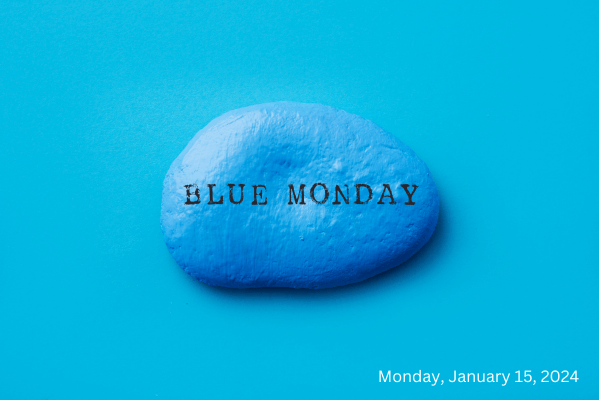Blue Monday

Have you heard of “Blue Monday” but are not entirely sure what it is or means? Blue Monday is a term applied to the third Monday of January (January 15 this year!) and has been labeled “the most depressing day of the year.” Its origins, however, had little to do with mental health. A travel company in the UK initially conceived the idea in the early 2000s. A psychologist was commissioned to generate a formula to promote this day as the most depressing time of the year. Obviously, the travel company’s goal was to sell more vacation travel packages to warm and sunny destinations. The formula looked at factors such as shortened daylight hours, Christmas bills coming due, gloomy winter weather, and the point on the calendar where most people tend to give up on their New Year’s resolutions. Though there’s little scientific evidence to claim that it is the most depressing day of the year, in the years following, many mental health organizations jumped on the idea to promote awareness about seasonal depression and the need for support and other self-help strategies to beat the winter blues.
Manitoba’s winters are long, dark, and cold. People must take care of their mental health this time of year. Research suggests that up to 35 percent of the general population experience the “winter blues,” which can include changes in appetite and increased lethargy as the daylight hours grow shorter. The winter blues differs from Seasonal Affective Disorder, or SAD, which affects about three to five percent of the population and is a serious form of depression. Symptoms of SAD include feeling significantly depressed most days, decreased energy, difficulty concentrating, weight gain, and disrupted sleep patterns.
People experiencing the winter blues or SAD can benefit from:
- Maximizing exposure to sunlight. Spend more time outdoors during the day and arrange indoor environments to receive maximum sunlight. The use of therapy lamps has proven benefits as well.
- Exercise. Exercise relieves stress, builds energy, and increases mental and physical well-being. Make a habit of taking a daily noon-hour walk. The activity and increased exposure to natural light can raise spirits.
- Social support and connection. Strong social networks reduce isolation, a key risk factor for depression.
- Stress reduction. Make changes in your life to help manage and reduce stress. Too much stress exacerbates depression and puts you at risk for future depression. Take the aspects of your life that stress you out, such as work overload or unsupportive relationships, and find ways to minimize their impact.
While it may not be scientifically accurate to designate the third Monday in January, or any day of the year for that matter, as the most depressing day of the year, it does offer the opportunity to engage in healthy conversations about mental wellness, especially at this time of year. Talking openly about seasonal depression and the support that is available for those who struggle helps reduce the stigma around mental illness and opens pathways for support and recovery. This year, several special events have been planned in the region to highlight the effects of seasonal depression and the support available. Check out the list below to see what’s happening on January 15 in your area:
Dauphin: The Dauphin HERO Club will spread cheer with uplifting inspirational quotes and blueberry muffins in the community. If interested in helping, contact Lori at 204-638-7104 or e-mail [email protected]
Swan River: The Canadian Mental Health Association will set up a display from 9:00-4:00 at the community booth in the Swan Valley Co-op food store. Drop by to pick up information on mental health and chat with a CMHA representative.
Roblin: The Roblin HERO club will be sharing blue treats in their community
Ste Rose: Spiritual Care & Health Promotion – We will share a “sweet“ blue treat, to brighten people’s day. Encouraging everyone to take extra care of themselves by connecting with others, doing something special for someone else to help brighten these winter days. If interested in helping out contact Susan Denhard at 204-447-4360 or email – [email protected]

